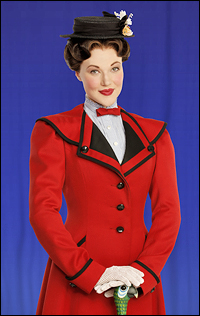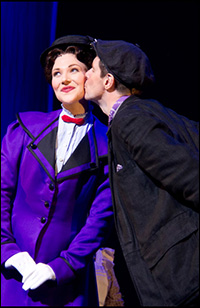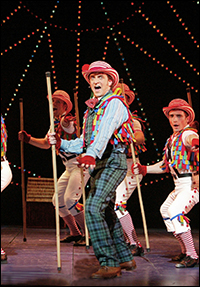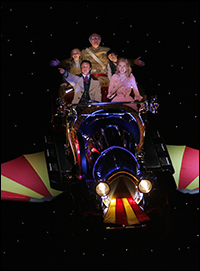Richard M. Sherman may describe himself as "the last man standing," but he certainly isn't standing still.
The Oscar-winning co-composer of the timeless songs for the Disney film classic "Mary Poppins" is the only still-living member of the film's top creative team, which included his brother, Robert B. Sherman (who died in 2012), and Walt Disney (who died in 1966) himself. The Shermans lived to see the film adapted as a hit Broadway musical, and, as of March 3, Richard will see the show close after 2,619 performances. But that end is the beginning of new projects, including a Disney-backed stage adaptation of another of his films, "The Jungle Book."
Sherman, 84, and his brother/partner learned their gift for wordplay from their father, songwriter Al Sherman. He encouraged the Sherman boys to make up their own words, which led to the likes of "Supercalifragilisticexpialidocious" and "Chim-Chim-Cheree.."
As house composer for Disney for eight years during the 1960s, the Sherman brothers composed songs for Winnie-the-Pooh shorts, and feature films including "The Happiest Millionaire," "The Aristocats," "The Sword in the Stone" and the aforementioned "Jungle Book," plus the anthem "It's a Small World After All." Outside of Disney their compositions include the film "Chitty Chitty Bang Bang" (also later adapted as a London and Broadway musical) and the Top 40 hit "You're Sixteen (You're Beautiful, And You're Mine)."
When they told you that Mary Poppins was closing, were you surprised?
One of the greatest prides of my life is the fact that we had Mary Poppins triumph on Broadway. That's a very wonderful thing — over 2,600 performances. It was a great, wonderful, shared experience. But, at the same time, it's very, very sad. It's a great achievement for a songwriter to have a show that plays on Broadway at all, and to have it play that long, and have so many people enjoy it and love it and talk about it. The only other redeeming thing is the fact that there are companies all over the world now playing Mary Poppins, and that makes me feel very good. We just came back from Mexico City, where an incredible all-Mexican cast, in Spanish, is doing the same show — same sets, same costumes, same everything — and it's just an incredible experience. So, it's alive and well and running in the world, but unfortunately it's saying goodbye to Broadway.
| |  | |
| Current Mary Poppins star Steffanie Leigh. | ||
| photo by Joan Marcus |
Wow. Well, that's a nice feeling. But let's face it, my brother Bob and I worked with one of the greatest storytellers in the world: Walt Disney. He knew how to tell a story for a family, and he knew how to create situations and feelings that were transcontinental — they went anywhere, they went everywhere, and they're universal. And, I think that was one of the wonderful, lucky breaks that Bob and I had — that we were given the assignment to work on "Poppins" in the very first place, and we were given free rein to use our own imaginations as to how to tell the story. If you read the original P.L. Travers books of "Mary Poppins," you'll see that there is no storyline whatsoever. It's strictly a bunch of wonderful experiences that this magical nanny has with the children of the Banks family. There was once a play called Six Characters in Search of an Author and "Mary Poppins" was really like So Many Characters in Search of a Story. You look at it — no story! We took six chapters that we thought were really juicy and visual and exciting — you know, jumping into the picture, things like that — and we actually made up a storyline to connect them.
The storyline of the musical, the one involving how Mary Poppins heals a dysfunctional family, that was originally created for the movie by my brother, Bob, and I and Don DaGradi. Walt Disney supervised DaGradi, Bob and myself in creating that storyline. We did it because we knew you can't keep people glued in their seats for two hours or more without a story. You're going to be pulling for somebody and worrying for somebody — it has to be there — so we had this father who is kind of distant and not connecting with his family, and we had the mother who is busy doing other things, so that Mary Poppins is needed. She comes, and she gives life lessons to the entire family, and that's what the magic of the whole thing is all about. Then, when she finishes her life lessons, she flies away. And, finally we said, "We have this storyline," and we told [Walt Disney] the storyline, and he loved it.
We also changed the time period of the story. The original stores were set in the Depression of the 1930s. But in the '30s there's no color, and who in America would believe that a middle-class family would have a live-in maid, a cook, a nanny and a handyman? Come on! That's impossible. So we said, "Let's turn it back to the turn of the century, a period with a whole different color. And, we used Music Hall-style music, that wonderful jaunty, cockney music. Walt dug everything we came up with.
I'll tell you a little incident that happened the first time we played him "Feed the Birds—tuppence a bag." That one little song is what "Mary Poppins" is all about. It says that it doesn't take much to give love. It doesn't cost you a nickel to be kind and loving. When we played it for Walt Disney, he said, "That's your whole story in a nutshell, isn't it?" And, we said, "That's right, Walt!" And, he said, "How'd you guys like to work for me?" And he put us on salary that day.
Didn't he say that was his favorite song?
Yes. After meetings, he'd say, "Stay, Dick," and then he'd say, "Hey, play it!" And, I would sing and play "Feed the Birds" for him. He loved it because he was feeding the birds all his life. He was giving kindness to people. He was giving them joy. He was giving them "Mary Poppins"! He knew he had something wonderful there, and he wanted to give it to the world, and I'm very proud to have been part of it.
| |  | |
| Steffanie Leigh and Gavin Lee at curtain call. | ||
| Photo by Krissie Fullerton |
That same spirit — that same storyline — that was in the movie is absolutely captured in the play version. I take no individual bow because God knows I worked with my brother Bob, and I worked with Walt Disney and Don DaGradi and Bill Walsh. Then, for Broadway, this whole new team of people came in and added to what we had done and made this wonderful musical Mary Poppins, which is just something that's a high point in my life. I'm thinking of the [stage musical] team of [librettist] Julian Fellowes, [songwriters] George Stiles and Anthony Drewe because they, also, were very, very creative and added great depth and great meaning to the play. A lot of the original [film] score stayed pretty much into the Broadway show, which is very satisfying to me. But the new writers added new songs and developed the story a little bit more, but still kept that storyline.
I think praise also has to be given to Cameron Mackintosh, a brilliant, brilliant, wonderful man, a great producer, and Tom Schumacher [president of Disney Theatrical Group]. These two guys got together and overcame all the problems of two corporate behemoths colliding. [Laughs.]
I took a look at the Mary Poppins books again last night — "Mary Poppins Comes Back," which is a great, big, thick book; "Mary Poppins Opens the Door" and "Mary Poppins in the Park," which is a kind of strange book. It seems like there is a lot of material there. Has there ever been talk of doing a sequel to Mary Poppins, just as P.L. Travers did sequels to "Mary Poppins"?
Well, let's put it this way — "Mary Poppins" was almost an impossibility to produce in the first place. I'm a consultant on a movie that we just finished shooting at the studio that's coming out later this year. It's called "Saving Mr. Banks," and it's the true story of how Walt Disney convinced Pamela Travers, the authoress, to give us the permission to do the movie because she was a real strange woman, and I'm being very nice about it… [Laughs.] She was a difficult lady, and she had created in her own mind this lovely family called the Banks family, and this lovely father who just went to the bank and made money and came home again — no storyline whatsoever — and she wanted to preserve that. We said, "You can't do a movie with this wonderful, magical Mary Poppins if you don't have problems in the family so that she comes in and solves them. That's what it's all about." And, she just hated the idea that we were doing that, so she was always incredibly negative, and the picture called "Saving Mr. Banks" tells how we finally got the movie made. I think it's a great movie. I'm so excited about it. It stars Tom Hanks as Walt Disney, Emma Thompson as Mrs. Travers, and Jason Schwartzman, who plays me! [Laughs.]
| |  | |
| Raul Esparza in Chitty Chitty Bang Bang on Broadway. | ||
| photo by Joan Marcus |
Who plays your brother?
B.J. Novak, a wonderful actor. Brad Whitford plays Don DaGradi. All the actual people and events that took place 50 years ago are portrayed very honestly and straightforwardly, and it's really a remarkable movie, and you will see how "Mary Poppins" was born.
How did it feel to be back at Disney?
Bob and I were full-time staff writers there for seven or eight years, but we have done so many things for the Disney company over the years…writing things for the theme parks, and coming back occasionally to do a movie. We did "The Tigger Movie" [in 2000] and some other things. So Bob and I never really quite left Disney. When this movie came up, I was asked to read the script and take a look at some of the incidents that I was involved with, and I helped supervise the way our voices sounded — how we spoke, how Walt spoke and everything. Because I'm the last guy standing in that group. Although they're all very alive to me, they're not with us anymore.
Was there any talk, by the way, when you were working with Tom Schumacher over at Disney Theatricals, of adapting any of your other films — like "Jungle Book"?
In fact, in a week and a half, I think, I go to the Goodman Theatre in Chicago for a workshop on a stage version Jungle Book staged by Mary Zimmerman [Tony winner for Metamorphoses and winner of a MacArthur Fellowship.] We're adding some new songs to fatten up the score and to fatten out the storyline. The Goodman is going to have it running there in June of this year. We're going to be incorporating real Indian instruments like a sitar — things like that — along with the jazz. We're going to play American jazz, but with new sound. It's going to be pretty fascinating.
Is that going to be their production or is that going to be Disney Theatricals?
I believe it'll be their production, and Disney Theatricals will have a hand in it. They might very well be wanting to bring it to Broadway or tour it, I don't know. Tom [Schumacher] hasn't committed yet; he's just listening. He's very careful. He's a very meticulous producer and a very talented one and, I must say, very dedicated.
And, the new songs—are these Sherman & Sherman songs or are these your songs alone?
Sherman and Sherman songs. There was going to be a second "Jungle Book" movie, but when Walt passed on [in 1966], the studio decided they didn't want to go ahead with the sequel. So they are songs that were written for the second version. We eventually got Phil Harris and a couple of people from the first movie, including Louis Prima, to sing them on an album called "More Jungle Book." I'm updating some of the lyrics on it, actually — sort of catering them to the play because the play, of course, is a different beast than the film.
| |  | |
| Ellen Marlow, Philip Bosco, Henry Hodges, Raul Esparza and Erin Dilly in Chitty Chitty Bang Bang on Broadway. | ||
| Photo by Joan Marcus |
RS: The most important part of any song is the idea — the idea behind it. Why do it? Everybody's written "I love you…I need you…I want you…I lost you." These things have been written a thousand times, but why don't you find some new way of saying something? Something that nobody has said it this way, and so Bob and I would always kill ourselves to come up with saying something different than anyone would say it, so we didn't say, "Have a happy attitude, and a tough job is easy," we said, "A spoonful of sugar helps the medicine go down"! Bob and I always dug, dug, dug, dug, dug for ideas, and then the lyrics — we'd both worked on lyrics. I'd sit at the piano. I'm more of a musician than Bob, so I would play, and he'd say, "Uh-uh! Change it!" We both sort of jammed our brains together and worked like that. It was unique — we worked together all the time. And, we'd come in with separate ideas, and then we'd define which ones were the good ones and which ones were ordinary, and we'd throw out the ordinary and keep the good ones. And, that's the way we did it.
Your dad was a songwriter, too. Did you learn that from your dad?
Oh, yeah… Our dad was the one who taught us the three rules of writing a good pop song — simple, singable and sincere. And, I tell you, we always tried to make our songs singable. Broadway is lacking melody today, and I'm not talking about anybody in particular. I'm just saying, I like to write singable songs that the people could hum on the way out. Jerry Herman did that, and Irving Berlin did that, and Rodgers and Hammerstein did that, and Rodgers and Hart did that, and Cole Porter did that, and those are my heroes.
Some of the obituaries said that you and your brother had been working right up until his death. Are there plans to complete or produce any of those projects?
There's a [musical] called Summer Magic [based on the Disney film of the same name] and another called MerryGoRound [sic] — a musical — which we wrote, waiting in the wings. Like all writers, we were always working on things and tightening them. But getting money today is a great challenge. And, so much money has to be gotten! [Laughs.] It's really incredible, and that's not my area, so the people involved are working like heck to do it. I know that we're trying to rekindle a wonderful [musical] that Bob and I loved, which is called Busker Alley.
The Tommy Tune show that closed in Florida during its pre-Broadway tryout when Tune broke his foot?
Yes. And we had the St. James Theatre all ready to go. After that we did a version with Jim Dale for one night. It proved to be beautiful, and Jim Dale loved the show and wanted to do it, but we never raised the money. The people just couldn't put it all together. I always believed in that show, but we've been very unlucky with it. Our wonderful writer, AJ Carothers, passed away, and then my brother passed away. I'm the last guy standing on that one too. But I love these projects, and someday I hope to get them done.
Now that you're on your own, are you writing as a single now or are you looking for a new collaborator?
No, I'm writing as a single because I write words and music. I've done a number of things now on my own, and I enjoy doing that. It's not a big jump for me to do that. I've done a lot of things now on my own — I've added new lyrics and things. Yeah, it's not like I'm sort of groping. [Laughs.] I'm still happy.











